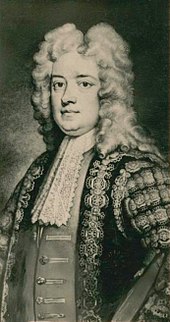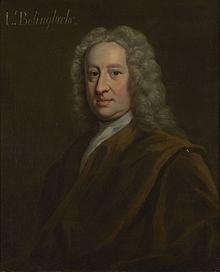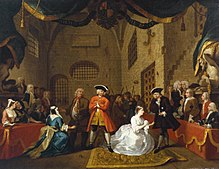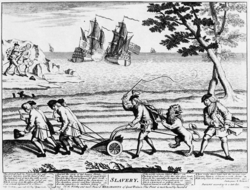Robert Walpole
Robert Walpole, 1st Earl of Orford , KG , KB , PC (born August 26, 1676 in Houghton , Norfolk , England , † March 18, 1745 in London ) was in fact from 1721, from 1730 also formally first Prime Minister of Great Britain , up to his resignation in February 1742.
Walpole, who was a member of the Whig Party , served during the reigns of Kings George I and George II. His tenure is normally counted from 1721, when he took over the office of Lord High Treasurer . But the year 1730 is also mentioned as the beginning of his term of office. This was when Viscount Charles Townshend retired and Walpole became chairman of the cabinet. This dispute about the length of his term of office stems not least from the fact that at that time there was no official office of a so-called prime minister . His tenure ended in February 1742, making it the longest in British history (see List of British Prime Ministers ).
Early years and family
Robert Walpole was born in Houghton , Norfolk in 1676 . His father, also named Robert Walpole, was a Whig politician who represented the Castle Rising community in the House of Commons . His mother was Mary Walpole, née Burwell. Robert was the third of 17 children, eight of whom died in infancy. That made Walpole the Prime Minister with the most siblings.
Robert received his education between 1690 and 1695 at Eton College . In 1696 he enrolled at King's College , Cambridge as a student. In 1698, however, he left the university again because his only older brother had died and he had to help his father with the management of the family property. By then, Walpole had planned to become a clergyman; now (since he would inherit the family property as the eldest son) he rejected this plan.
On July 30, 1700, he married Catherine Shorter (d. August 20, 1737) of Bybrook, with whom he had two daughters and four sons:
- Robert, 2nd Earl of Orford (1701–31 March 1751), Lord (Robert Walpole Jr.) Ranger of Richmond Park
- Katherine (May 13, 1703– October 22, 1722)
- Horatio (1704–24 July 1704)
- Mary (1705– January 2, 1732), later Mary Cholmondeley, Viscountess Malpas
- Horace Walpole , 4th Earl of Orford (1717–1797), was a writer , politician and architect . He is considered to be the founder of the " Gothic Novel ".
- Edward (1706–1784), later Sir Edward. His illegitimate daughter Mary later married into the royal family as the wife of William Henry, Duke of Gloucester and Edinburgh , brother of King George III.
When Lady Walpole died, Robert Walpole married his lover Maria Skerritt. They had officially been living together in Richmond , North Yorkshire , Houghton Hall and London since around 1724 . They had an illegitimate daughter together who was later raised to the nobility as Lady Mary Walpole.
Early political career
Walpole's political career began in January 1701 when he won parliamentary elections in the Castle Rising constituency . His father (who died three months earlier) had already represented this constituency. In 1702 he left the constituency to take over the more important King's Lynn constituency . There he was then re-elected in every election for the next 40 years.
Like his father, Robert Walpole was a staunch supporter of the Whigs, who at the time had a majority over the Tory party. In 1705, Walpole became a member of the Lord High Admiral's Council , a body that oversaw naval affairs. This office was then held by Prince George of Denmark , the husband of Queen Anne of England. Walpole's administrative skills were quickly recognized and he was appointed Minister of War in 1708 by Sidney Godolphin, 1st Earl of Godolphin , Lord High Treasurer and Head of Cabinet. For a short time he was also Treasurer of the Navy .
Walpole's service in these offices made him a close advisor to John Churchill, 1st Duke of Marlborough , who was then supreme commander of the British forces in the War of the Spanish Succession and an influential politician. Walpole quickly became one of the most influential cabinet members.
Despite his assertiveness, he did not succeed in preventing Lord Godolphin and the Whigs from pushing for a lawsuit against Henry Dingverel. Sachverel was a minister and was a constant lecturer against Whig. The opening of a trial made the Whigs rather unpopular nationwide and ultimately led to the political decline of the Duke of Marlborough and the Whigs in the 1710 election. The new Tory government, headed by Robert Harley, removed Walpole from the post of Secretary of War, allowing but he remained Treasurer of the Navy until January 2, 1711. Harley tried to persuade him to join the Tories, but Walpole refused and instead became one of the most publicized Whigs in the opposition.
He defended Lord Godolphin against attacks by the Tories in parliamentary debates and the press. Annoyed by these attacks, the Tories planned to ruin and discredit him along with the Duke of Marlborough. In 1712 they untruthfully claimed that he was guilty of corruption in the office of Minister of War. Walpole was charged for this by the House of Commons and found guilty by the overwhelming Tory majority in the House of Lords . He was then imprisoned in the Tower of London for six months and excluded from Parliament. This hurt the Tories, however, as Walpole was viewed in public as the victim of an unjust trial. In the election of 1713 he was re-elected by his voters. Walpole developed a marked hateful relationship with the two Tories who had initiated his impeachment lawsuit.
Stanhope / Sunderland government
Queen Anne died in 1714 and, due to the Act of Settlement, she was succeeded by a distant German cousin, Georg, the Elector of Braunschweig-Lüneburg, as King George I. Georg I mistrusted the Tories because he believed that they were rejecting his succession to the throne (The Act of Settlement had excluded several of Queen Anne's elder relatives from line of succession due to their Roman Catholic beliefs). 1714 was not only the year of George's accession to the throne, but also the beginning of Whig supremacy, which would last for 50 years. Robert Walpole was appointed privy councilor and paymaster general of the army. He was a member of the cabinet of Lord Charles Montagu, 1st Earl of Halifax, although Walpole's brother-in-law, Lord Townshend and Earl James Stanhope were the actual dominant members of the cabinet. Walpole also became chairman of a secret committee that investigated what was going on in the former Tory ministries. Those involved in Walpole's dismissal proceedings in 1712 were now under attack even for political reasons. Lord Oxford was deposed and Lord Bolingbroke had to submit to a parliamentary trial under the Bill of Attainder.
Lord Halifax, the official head of government, died in 1715. Walpole was then promoted to First Lord High Treasurer and Chancellor of the Exchequer. In this position he introduced the "sinking fund" system, with which he significantly reduced the national debt. Two camps often formed within the cabinet when discussing important issues. Usually Walpole and Lord Townshend were on one side, Stanhope and Charles Spencer (Earl of Sunderland) on the other. The main point of contention was often foreign policy, as Walpole and Townshend were of the opinion that King George I was thinking more about his German lands than about British interests in foreign policy. Stanhope and Sunderland, on the other hand, supported the king. Townshend was removed from his post as Secretary of State for the Northern District in 1716 and was given the less influential position of Lord Lieutenant of Ireland . This demotion was not enough for Stanhope and Sunderland and they managed to get Townshend to lose this office in April 1717. As a result, Walpole resigned from cabinet the next day and joined Townshend in the opposition. The newly formed cabinet was then dominated by Sunderland and Stanhope.
Shortly after Walpole's withdrawal, a serious family dispute between King George I and the Prince of Wales divided the royal family. Walpole and various opposition politicians took advantage of this and met him at Leicester House , the residence of the Prince of Wales, and made political plans. Walpole also became a close friend of Caroline, the Prince's wife. In 1720, Walpole also strengthened his position by bringing about a reconciliation between the Prince of Wales and the King.
Walpole remained an influential figure in the House of Commons, being particularly vigorous in opposing the Peerage Bill, which was intended to limit the king's influence in appointing new nobles. Walpole managed to get the House of Commons to temporarily suspend the 1719 Act and eventually repeal it entirely. This defeat made Lord Stanhope and Lord Sunderland come to terms with their opponents. Walpole became paymaster general of the Army again and Townshend became Lord President of the Council . By Walpole's return to the cabinet, however, he lost the favor of the Prince of Wales (the future King George II), who disregarded his father's government.
Ascent
Shortly after Walpole's return to the Cabinet, Britain was gripped by an enthusiastic wave of speculation, the South Sea Bubble . The government had drafted a plan for the South Sea Company to take over the national debt in exchange for profitable bonds. It was widely believed that the company would generate enormous profits from trading in clothing, agricultural products, and slaves. Many people, including Walpole, invested in the company. Towards the end of 1720, the company began to decline as the prices of their goods collapsed. Walpole was only saved from financial ruin by the fact that his banker advised him to sell his shares early on.
In 1721 a committee investigated the scandal and found that there were many corrupt cabinet members involved, including Chancellor of the Exchequer John Aislabie, Secretary of the Post James Craggs the Elder, Secretary of State for the Southern District, James Craggs the Younger, and even Lord Stanhope and Lord Sunderland. Craggs the Elder and Craggs the Younger fell from grace and died soon after. The other cabinet members were dismissed for corruption, Aislabie was even found guilty and imprisoned. Walpole was able to save Stanhope and Sunderland from imprisonment through personal influence. This earned him the nickname "General Patron Saint". With Sunderland's abdication and Stanhope's death in 1721, Walpole was the most influential figure in the government. On April 4, 1721 he became First Lord of the Treasury, Chancellor of the Exchequer and Chairman of the House of Commons. Walpole's tenure as prime minister is often equated with being appointed to these offices in 1721. In truth, Walpole shared power with his brother-in-law, Lord Townshend, who was Secretary of State for the Northern District and who directed foreign policy. Lord Carteret, the secretary of state for the southern district, was also an influential member of the cabinet.
Prime Minister under George I.
Under Walpole's leadership, Parliament tried to deal with the current financial crisis. The property of the directors of the South Sea Company was confiscated and used to alleviate the suffering of the victims of the financial collapse. The company's share capital was split between the Bank of England and the East India Company. The crisis had seriously damaged the credibility of the king and the Whig party, but Walpole stood up for both with skilful rhetoric in the House of Commons.
Walpole's first year as Prime Minister continued to be marked by the exposure of a Jacobite conspiracy by Francis Atterbury , Bishop of Rochester . This exposure shattered the hopes of the Jacobites, whose previous rebellions in 1715 and 1719 had also failed. One of the leading members of the Tories, Lord Bolingbroke, then fled to France to avoid punishment for his Jacobite sympathies. However, he was allowed to return to Great Britain in 1723.
During the rest of the reign of George I, Walpole retained his influence. The king's political power gradually waned and the power of his ministers increased. In 1724, Lord Carteret, the main rival of Walpole and Townshend in the cabinet, was removed from the post of Secretary of State of the Southern District and reappointed the less influential Lord Lieutenant of Ireland . This gave Walpole and Townshend final power in the ministry.
They managed to keep Britain at peace, particularly by negotiating a treaty with France and Prussia in 1725. Since the country was now neither threatened by Jacobites, war or financial crises, the economy flourished and Walpole's reputation with King George I grew. In 1725 he was awarded the Order of Bath and in 1726 the Order of the Garter (which earned him the nickname "Sir Wüterich "). His eldest son was also appointed Baron Walpole .
Prime Minister under George II.
The position of Sir Robert Walpole was threatened by the death of King George I in 1727. The heir to the throne George II initially wanted to remove Walpole from his office, but was changed by his wife Caroline . Townshend, whom the king also disliked, kept his office. Over the next few years, Walpole shared power with Townshend, but increasingly became the dominant figure in government. There was a rift between the two over foreign policy, especially that towards Prussia, but Walpole prevailed here too. Townshend finally resigned on May 15, 1730. This date is also often seen as the start of the Prime Minister's term.
During the following years, Walpole's influence grew stronger than ever. Since he was sure of the support of Queen Caroline and, to some extent, King George II, he made extensive use of this royal favor by awarding awards and setting up lucrative political offices. He carefully selected the members of his cabinet and got them to act unanimously. No head of government had had such an influence before. Walpole is believed to be Britain's first Prime Minister.
As he was highly polarized, Walpole had many opponents, the most famous of which since the time of Queen Anne was Lord Bolingbroke. Even William Pulteney, 1st Earl of Bath , was snubbed because Walpole had not received the capable statesman in his cabinet. Bolingbroke and Pulteney were the editors of a magazine called The Craftsman, in which they ceaselessly denounced the Prime Minister's policies. Walpole has also been the constant target of satires and parodies. He has often been compared to the criminal Jonathan Wild , as did John Gay in his farce " The Beggar's Opera ". Other enemies of Walpole were Jonathan Swift , Alexander Pope , Henry Fielding and Samuel Johnson .
Despite this opposition, Walpole secured the support of the people and the House of Commons through policies aimed at avoiding war, which was reflected in low taxes. He used his influence to the effect that he prevented King George II from participating in the War of the Polish Succession to the European mainland in 1733 . However, his influence was seriously jeopardized in the same year when he introduced a new tax law into parliament. State revenues had been severely reduced by smugglers, so Walpole suggested that taxes on wine and tobacco should be replaced by a consumption tax. In order to counteract smuggling, this tax should not be levied in the ports, but first in the warehouses. This proposal was extremely unpopular and was rejected by British merchants. Walpole then withdrew the law, but in return dismissed all politicians who had dared to disagree. As a result, however, he lost a large part of his Whig party to the opposition.
After the parliamentary election of 1734, his loyal followers still formed the majority in the lower house, albeit in fewer numbers than before. He retained his supremacy in parliament, but his popularity began to decline. In 1736, a tax increase on gin sparked unrest in London and the country. In Edinburgh the so-called "Porteous Riots" broke out, as the king pardoned a captain of the guard (John Porteus) who had previously instructed his troops to shoot protesters. While these incidents damaged Walpole's reputation, they did not result in him losing a majority in parliament. This was particularly evident in the case when he easily thwarted Sir John Barnard's plan to reduce the share of the national debt. He also got Parliament to pass the law on curfew in pubs and theaters in 1737 . This was a retreat to Swift, Pope, Fielding, and other writers who had attacked his government in their works.
Decline
In 1737, Walpole's close friend, Queen Caroline, died. King George II had developed a better relationship with Walpole over the years, but he still controlled the government less and less. A vocal opponent in the opposition was Frederick, Prince of Wales , who had become estranged from his father the king. He was joined by some young politicians such as William Pitt the Elder and George Grenville, whose faction called itself the "Patriot Boys".
It is possible that Walpole's policy of avoiding military conflicts led to his loss of power. In the Treaty of Seville in 1729, Great Britain undertook not to trade with the Spanish colonies in North America. Spain had guaranteed the right to board and search British ships in order to verify compliance with the treaty. However, there were discussions about whether it was allowed to trade with the Caribbean. Walpole wanted to avoid war on this issue, too, but had strong opponents in the King, the House of Commons and parts of his cabinet. In 1739, Walpole gave up his resistance and began the War of Jenkins' Ear , so named because Captain Robert Jenkins complained that Spaniards had severed his ear when they were inspecting his ship. After the war began, Walpole lost its influence more and more rapidly. In the parliamentary elections of 1741, his party was able to increase the number of votes in densely populated electoral districts, but lost it in many rural districts, where squires still had unofficial influence on the vote. The gains in England and Wales did not make up for the losses in the 1734 election. In Cornwall, Walpole's followers also lost in 1741, as many constituencies were under the influence of the Prince of Wales, who was also the Duke of Cornwall. These constituencies had put up candidates who were hostile to Walpole and so returned to parliament. The influence of John Campbell, 2nd Duke of Argyll in Scotland meant that opponents of Walpole were elected there too. Walpole's majority was seen as unstable as the loyalty of the first-time elected MPs was difficult to gauge. The voting ratio was estimated at 14: 8.
In the new Parliament, many Whigs found the aging prime minister incapable of conducting a military campaign, and his majority in deciding this matter continued to melt, so that supporters and critics faced each other in equal numbers.
In 1742 the House of Commons had to decide on the validity of an allegedly rigged by-election in the constituency of Chippenham, Wiltshire. Walpole and his supporters agreed to use the result of the vote as a vote of confidence in the government. Since the vote was lost, he resigned from his government offices. In the course of this resignation it was agreed that the king appointed him as Earl of Orford to a member of the House of Lords , which then happened on February 6, 1742. Five days later, he officially handed over his official seal.
Later years
His successor as Prime Minister was officially Lord Wilmington, but the actual head of government in the cabinet was Lord Carteret. An investigation was launched into whether there had been any irregularities during Walpole's reign, but it was concluded with no evidence of corruption or wrongdoing. Although Walpole was no longer a member of the cabinet, he still acted as a personal advisor to King George II and was often given the title "Minister behind the curtain". So he managed in 1744 to get Lord Carteret to be deposed and to appoint Henry Pelham .
The following year, Walpole died in London shortly before his 69th birthday. He was buried in his hometown of Houghton. His title of nobility passed to his eldest son Robert, who in turn was inherited by his only son George. After his death, the earliest dignity passed to the younger Horace , a well-known writer. Horace Walpole died without an heir.
legacy
Walpole's influence on politics at the time was enormous. The Tories became a small, insignificant faction and the Whigs became the dominant party. He was Britain's first Prime Minister, relying less on the support of the House of Commons than on the favor of the King. His successors in office were comparatively weak personalities and it took decades for the office to regain such a strong position as it was in its day. Walpole's strategy of keeping Britain out of acts of war brought prosperity to the country. He strengthened the position of the Hanover royal family and fought the Jacobites, whose rebellion ended shortly after Walpole's resignation in 1745.
Another of Walpole's legacies is 10 Downing Street . The house, previously inhabited by Johann Caspar Graf von Bothmer , was given to Walpole in 1732 by King George II as a personal gift; Walpole only accepted the gift as the official residence of the Lord High Treasurer. He himself moved there on September 22, 1735. His immediate successors did not always live in this house and preferred to move into their private residences. But the house remained as an official residence.
Walpole also bequeathed a famous art collection that he gathered during his tenure. The collection was sold by his grandson to the Russian Empress Catherine II in 1779 . The collection, considered one of the most beautiful in Europe, is now in the State Hermitage Museum in Saint Petersburg, Russia.
The nursery rhyme "Who killed Cock Robin" is supposed to be an allusion to the decline of Walpole.
The city of Walpole in the US state of Massachusetts , founded in 1724, was named after him.
literature
- Jeremy Black: Walpole in Power. Sutton Publishing, Stroud 2001.
- Harry T. Dickinson: Walpole and the Whig Supremacy. English Universities Press, London 1973.
- Brian W. Hill: Sir Robert Walpole: "Sole and Prime Minister." Hamish Hamilton, London 1989.
- Edward Pearce: The Great Man. Sir Robert Walpole: Scoundrel, Genius and Britain's First Prime Minister. London 2007.
- John Harold Plumb: Sir Robert Walpole. 2 volumes. Cresset Press, London 1956-1960.
- John Harold Plumb: The Growth of Political Stability in England 1675-1725. Macmillan and Co, London 1967.
- EP (Edward Palmer) Thompson: Whigs and Hunters. The origins of the Black Act Allen Lane / Penguin, London 1975, ISBN 0-7139-0991-9 .
Web links
- More about Sir Robert Walpole on the Downing Street website.
Remarks
- ↑ Robert Harley (who had become Earl of Oxford and Earl Mortimer ) and Henry St. John, 1st Viscount Bolingbroke
- ^ Iona Opie, Peter Opie (Eds.): The Oxford Dictionary of Nursery Rhymes . Oxford University Press, Oxford 1997, ISBN 0-19-860088-7 .
| predecessor | Office | successor |
|---|---|---|
| New title created |
Earl of Orford 1742-1745 |
Robert Walpole |
| personal data | |
|---|---|
| SURNAME | Walpole, Robert |
| ALTERNATIVE NAMES | Orford, Robert Walpole, 1st Earl of; Walpole, Robert, 1st Earl of Orford |
| BRIEF DESCRIPTION | first Prime Minister of Great Britain |
| DATE OF BIRTH | August 26, 1676 |
| PLACE OF BIRTH | Houghton , Norfolk , England |
| DATE OF DEATH | March 18, 1745 |
| Place of death | London |






